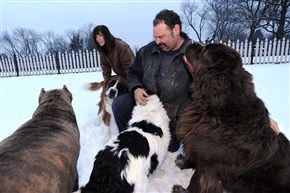Nate Guidry/Post-Gazette
Carolyn Barber walks her dog Barrett around Highland Park Wednesday afternoon. After walking a dog outdoors in winter, it is recommended that their feet be wiped off or washed to keep them from licking and ingesting ice melt products.
By Larry Gerson V.M.D.
People who own and care for pets need to take common-sense precautions for the cold, snow and ice.
When temperatures plummet, farm dogs, hunting dogs, outdoor cats and pets that live outdoors need to be taken into a basement or garage where temperatures are more moderate. In less bitter weather, water bowls should be watched and prevented from freezing. Outdoor enclosures should have dry bedding and be protected from wind. Additional heat sources can keep an outdoor animal more comfortable.
Increasing pet food is necessary in cold weather as extra calories are burned keeping animals warm. Any cases of suspected neglect of an outdoor animal should be reported to a humane agent immediately.
Exercise pets in cold weather carefully. Dogs often are troubled by ice and snow between their pads. Solutions include trimming the fur between the pads or using pet boots or Musher’s Secret, a wax product that keeps the ice from forming. The other possibility is to limit walking and hiking in freezing weather.
Pet-friendly ice melt products are a good idea for sidewalks and driveways. You still may need to wipe off or wash dogs’ feet once they’re indoors to keep them from licking and ingesting ice melt products.
Many people ask their veterinarian how to know if the weather is too cold to walk a pet outside. I often tell them to open their coat and if is too cold for them, it is too cold for the pet.
Common sense is the key here. A large dog with a heavy coat can tolerate more winter weather than a small or short-haired pet. Once we get deep snow, the icy crust can be hazardous. Sometime a small dog can walk on top without breaking through the snow crust but a large dog can barely navigate. Pet stores carry a wide array of protective pet clothing such as sweaters and coats to make a pet more comfortable.
Winter is a common time for owners to notice arthritis in animals. Remember that dogs and cats age roughly five to seven times faster than people. If pain and discomfort are slowing down a pet, restrict the time out in the snow. Leash walking may be better than running free. Supplements and pet-specific pain relief prescriptions are available. Use only products that you know are safe in animals. Even when used properly, pet medications can have side effects that you should be aware of. Speak to your veterinarian before using any medications in your pet. We often see educated owners using human products incorrectly on animals. Small amounts of human pain medication can be lethal to a pet.
Another common winter hazard is antifreeze, which is sweet-tasting yet toxic for pets. Use extreme caution in cleaning up spills so that your pet has no access to antifreeze.
Outdoor cats sometimes seek heat from car engines. Using the horn in the morning may wake the neighbors but also scares cats who may be hiding under the hood.
Lawrence Gerson is a veterinarian and founder of the Point Breeze Veterinary Clinic. His biweekly column is intended to educate pet owners. Consultation with a veterinarian is necessary to diagnose and treat individual pets. If you have a question you’d like addressed in Pet Points, email pe*******@**********te.com. Please include your name and municipality or neighborhood.


